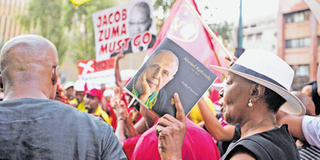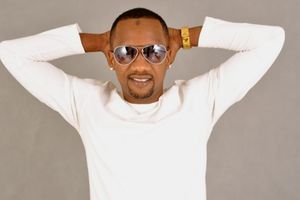African oppositionists defy the stormy waters

A woman holds a flyer as she takes part in a protest calling call for President of South Africa Jacob Zuma to step down outside the Johannesburg City Hall on April 1, 2017. PHOTO I FILE
What you need to know:
- In South Africa, for instance, top opposition leaders are at the forefront in calling for the speedy departure of embattled President Jacob Zuma, who is facing yet another motion of no-confidence.
Nairobi. In the wake of the recent media shutdown and a dramatic clampdown on the opposition in Kenya, opposition parties in other African countries have been flexing their muscles against all odds.
In South Africa, for instance, top opposition leaders are at the forefront in calling for the speedy departure of embattled President Jacob Zuma, who is facing yet another motion of no-confidence.
Among Zuma’s detractors are oppositionists Bantu Holomisa of the United Democratic Movement (UDM) and the fiery Julius Malema of the Economic Freedom Fighters (EFF) party.
They have reportedly won the support of Mmusi Maimane of the Democratic Alliance, with the latest vote of no confidence against Zuma scheduled for budget day.
According to the Speaker of Parliament, Ms Baleka Mbete, the budget will be read on February 22, days after the President’s State of the Nation Address.
Assuming that he will already have taken over the top job from his beleaguered boss, supporters of vice-president Cyril Ramaphosa, who is also the ANC president, have reportedly demanded that he and not Zuma should make the crucial address.
The latest deadline for Zuma’s exit from the presidency is February 21, and opposition street protests have been planned for what some have termed “the final push”.
In the meantime, on Wednesday this week the government of Chad suspended the activities of 10 opposition parties for two months.
The parties were accused of “disturbing public order” and “inciting violence”, and the move followed a march on Tuesday called by the country’s unions but forcefully dispersed by police, reportedly leaving some people injured.
The suspension, announced by security minister Ahmat Mahamat Bachir, followed a decision by the parties to back trade union calls for a mass protest over austerity measures.
Also banned was a major march scheduled for Thursday, and which was expected to bring together civil groups, trade unions and opposition politicians opposed to recent cuts in public spending.
Although described by the Finance ministry as vital for staving off bankruptcy in the country, the cuts have increased social tension and anger at President Idriss Déby, who has been in power since 1990.
Instructively Chad, where almost half the population of 14 million lives below the poverty line, has endured two years of severe recession worsened by a slump in oil prices.
As the country’s oppositionists took to the streets, their counterparts in Sierra Leone were challenging a proposal by the police to ban vehicular movement during election day on March 7.
The police proposal was contained in an MoU it presented to the parties last month, and was purportedly informed by the rising tension in the run-up to polling day.
Described as a security measure, it would see only government vehicles and those with a special pass allowed on the roads.
Opposition leaders however protested that they were not consulted when the MoU was prepared, and were only presented with it for signing.
Even as the police vowed to implement the MoU, they declined to sign it and described the move as suspicious, saying it would effectively lock down the country.
According to media reports, ten of the 17 registered political parties were opposed to it, claiming that the planned restriction was bound to bring to question the integrity of the electoral process.
Given that many polling centres are long distances apart Dr Denise Bright, the chairman of the National Grand Coalition (NGC), said the police proposal infringed on citizen’s rights of movement and assembly.
Following claims that the aged and people with disabilities would particularly be affected, in a joint statement issued on Wednesday the parties called on the Inspector General of Police to scrap the plan.
Also raised were other concerns they wanted addressed ahead of the March 7 polls, particularly relating to the general conduct of the police force.
Claiming that its members had previously been used to rig elections in favour of the incumbent, the oppositionists demanded several reforms on their deployment.
Pointing out that the police would be on duty on voting day and would be free to vote wherever they find themselves, the opposition leaders alleged that in the past rogue police officers had taken advantage of that arrangement.
While claiming that in the past police officers had voted multiple times, to the advantage of the ruling All People’s Congress (APC) party, the leaders also alleged that that thugs have been given police uniforms.
That would enable them to intimidate other parties’ agents and facilitate vote rigging, said the leaders, threatening to go to court if their demands were not met.
The leaders of 10 opposition parties were scheduled to meet Friday to deliberate further on plans for the looming election.




